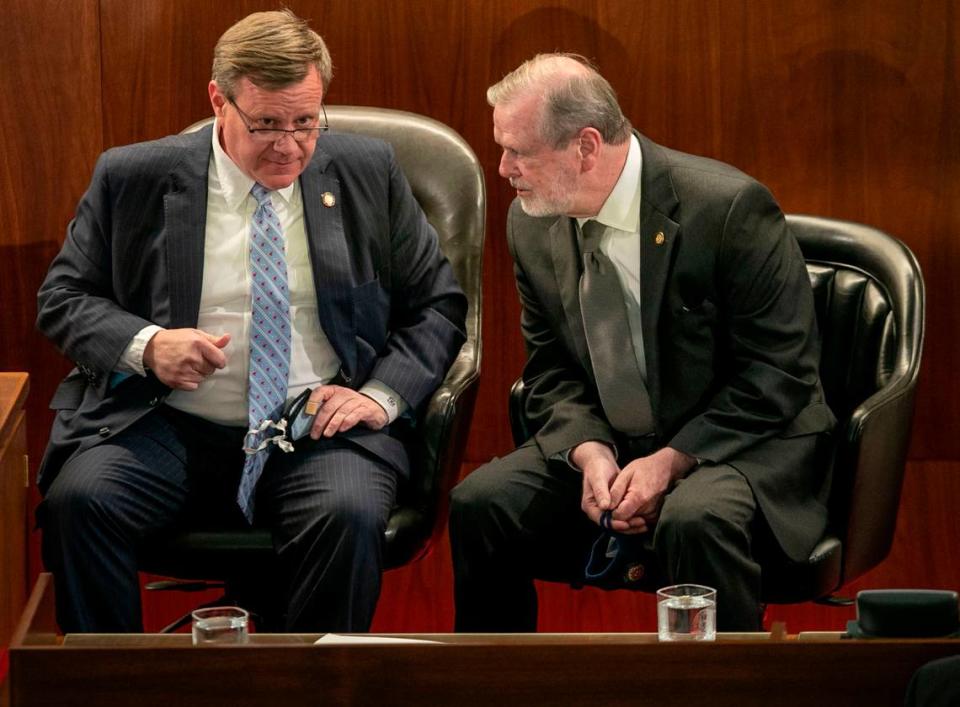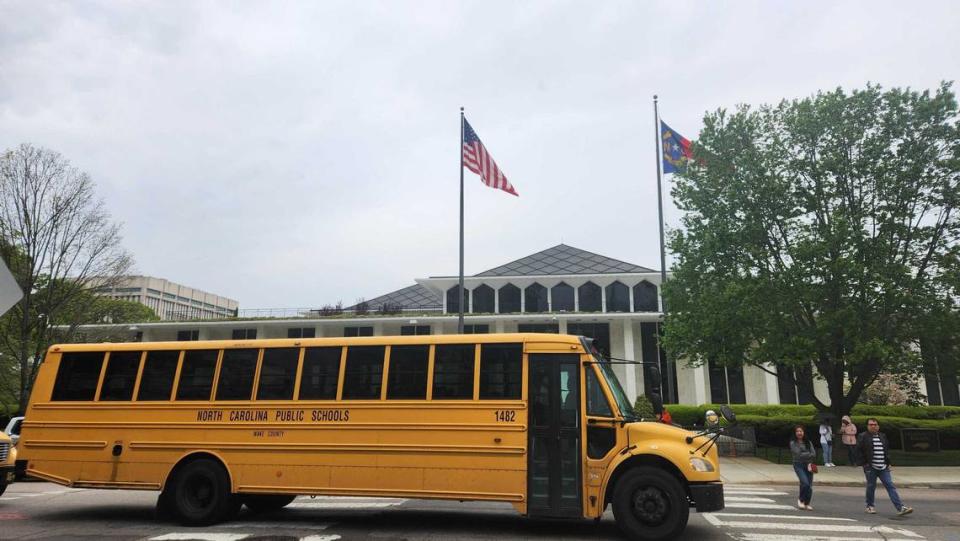‘A little cooling off.’ Where things stand with NC’s summer budget battle
The North Carolina General Assembly, which is completely controlled by Republicans, is at an impasse over the state budget — again.
The end result could be additional raises for thousands of state employees and public school teachers, more taxpayer funding of private schools and grants for child care centers.
Or the General Assembly could finish most of its work next week and go home, at least for “a little cooling off.”
Here is where things stand, and what it means for North Carolina taxpayers, employees and students.
House passed budget, Senate debate Monday
On Thursday, the House passed its budget proposal hours after Senate Republicans introduced their own proposal in a committee. The Senate will debate its bill on Monday night, with amendments allowed, so its final version may change before it is passed.
House Bill 263, the budget bill written by House Republicans, passed 68-36. All Republicans voted in favor, as well as three Democrats: Rep. Garland Pierce, Rep. Shelly Willingham and Rep. Michael Wray, all of whom are Democratic swing voters who have previously supported Republican-written budgets. A handful of Democrats usually vote with Republicans on the budget.
The coming week will be a busy one for House votes, too, including veto overrides, House Speaker Tim Moore, a Kings Mountain Republican, said Thursday. Then lawmakers will be on a break the week of the Fourth of July, and for at least two weeks after that.
“It may be that perhaps during this summertime with a lot of heat, maybe a little cooling off might be a good thing around this building as well,” Moore told House members.
There is no law about the end date of a legislative session. Moore told reporters on Thursday afternoon that House members may not return in August, either. He said he was open to a September return to tie up any loose ends, including a budget adjustment.
The budget stalemate means there will be two very different versions of a state budget adjustment bill, and as of now, not much daylight between them. If there’s no new budget passed, the state will just spend what was already planned in the two-year budget passed in October.
Moore told reporters on Thursday that the House will not take up the Senate’s budget next week. And the Senate has no interest in the House’s budget, either.
Senate leader Phil Berger told reporters on Thursday that at the end of the month, the Senate plans to go into no-vote sessions, meaning that they won’t officially adjourn the session but will take an indefinite break.
Reason for dueling House, Senate budgets
During the last two legislative short sessions held in even-numbered years, House and Senate leaders came up with a budget adjustment bill behind closed doors. This year, they released competing bills the same week after negotiations broke down.
The chambers had been at odds over how much money to allocate versus put in savings, with the House wanting to spend about $1 billion that the Senate wants to save.
Moore said as of Wednesday that the chambers “were only $30 million apart on a $32 billion budget. And instead of getting a response back, what I got was the Senate just kind of moving on out there and filing their own bill without any consultation or notice of the House.”
“We will not respond well to negotiation tactics like that,” he said.
Berger said the spending gap is much larger.
“We are $312 million apart in new net general fund spending that the House has, in their last offer. The total we’re apart is $523.8 million. Might need to buy a calculator,” Berger told reporters after Thursday’s Senate session.
Senate Minority Leader Dan Blue, a Raleigh Democrat, said in a committee Thursday that “working people are not a priority” in the Republican-written Senate budget, given that the proposal does not fully fund what child care advocates say is needed when federal funding of child care stabilization grants ends June 30.
In response, Sen. Ralph Hise pointed out that the budget is only meant to make adjustments to the two-year budget passed last year. “We are not doing a new budget for the fiscal year,” said Hise, a Spruce Pine Republican and a top budget writer.
How are the budgets different?
The Senate proposal is just 46 pages, compared to the House’s 271-page budget adjustment bill.
▪ The Senate budget does not make changes to the raises coming with the new fiscal year that begins July 1: 3% for most state employees and step-increases for teachers that vary by experience. The House proposal adds a 1% raise for state employees, bringing this year’s potential raise for most state employees to 4%.
Suzanne Beasley, a lobbyist for the State Employees Association of North Carolina told the senators that they should consider the surplus and nearly 25% vacancy rate of state employees as they negotiate a final budget.
▪ The budget passed this past fall allocated money for teachers and school personnel, but additional legislation is required before the raises can go into effect. If there is no new legislation, those raises for teachers and other school personnel will be delayed. State employees, however, do not need an additional move to get their money.
Hise noted the average teacher salary of about $59,000, including local supplements, was a significant raise over the past decade. Republicans are often quick to point out that when Democrats controlled the legislature, there were layoffs. Teacher pay increases the most for those in their early career, while veteran teachers’ salaries plateau for several years once they have 15 years of experience.
Sen. Michael Lee, a New Hanover County Republican, said that the state only sets base pay, and that increases for early career teachers are meant to prevent attrition.
▪ The Senate and House budgets allocated millions more dollars for private K-12 schools in the form of the Opportunity Scholarship program, which gives vouchers to students to go to private schools, to clear a backlog of about 55,000 students.
We know what you did last summer
It has become tradition in the Old North State to fight over the budget, no matter if the opposing lawmakers are in the same political party. The law does not require the legislature to pass a budget by the June 30 end of the fiscal year, so they argue well beyond that unenforceable deadline.
Berger said the Senate is willing to return after June 30 if there is a budget agreement.
“So if they — at whatever point — decided to get serious about the spending number, we are willing, able and ready to engage,” Berger said.
“There’s no need to just stay here and try to force something that’s not going to happen,” Moore told reporters about the House budget stalemate this summer. “We adopted a two-year budget last year, we funded things in year one, and in year two. This is year two,” he said.
In 2023, budget negotiations between the Republican-controlled Senate and House dragged out all summer long.
In the fall of 2023, already months late, the state budget’s two-year spending plan was passed and allowed to become law by Democratic Gov. Roy Cooper.
Before Republicans gained a supermajority last year, the budget stalemates of recent years involved Cooper and Democrats on one side, and Berger, Moore and other Republicans on the other. In 2019, instead of one budget becoming law, a series of smaller budget bills were passed, and only some employees received raises.
NC Reality Check is an N&O series holding those in power accountable and shining a light on public issues that affect the Triangle or North Carolina. Have a suggestion for a future story? Email realitycheck@newsobserver.com
Under the Dome
Get the latest news about North Carolina politics from The News & Observer's award-winning team. Get the free digest sent to your inbox by signing up here.




